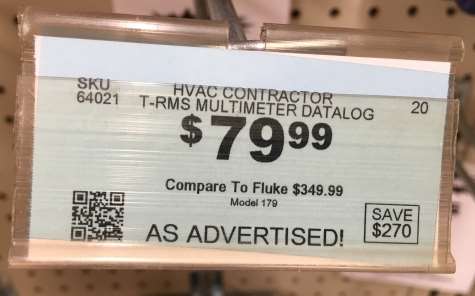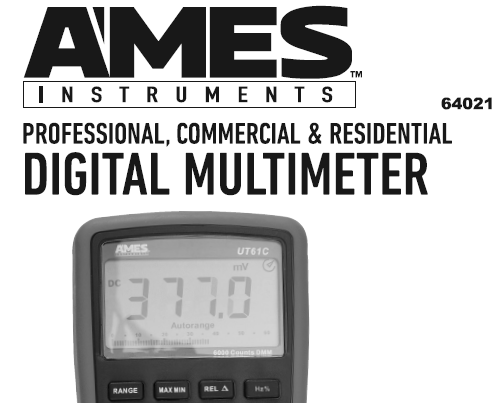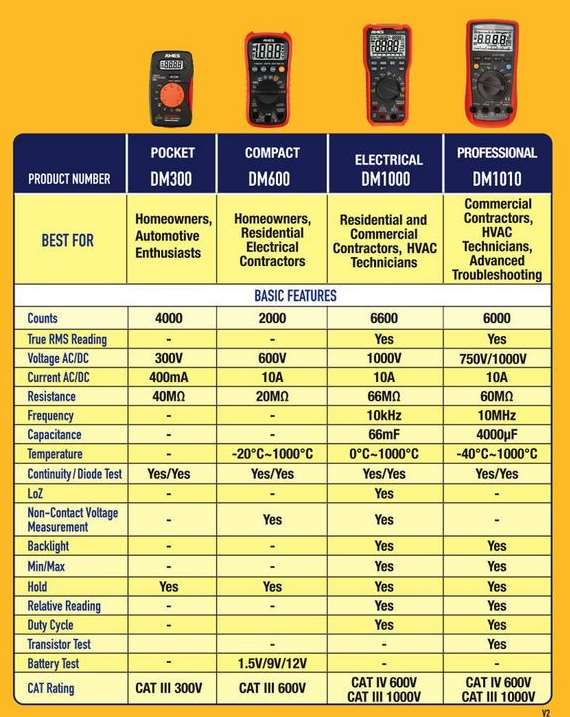You Are Here: Greyghost > Product Reviews > Harbor Freight/Ames DM1010 Digital Multimeter Review
Harbor Freight/Ames DM1010 Digital Multimeter Product Review
A
while back, Harbor Freight Tools (HFT) revamped their entire product
lineup of digital multimeters, retiring the Cen-Tech name and replacing
it with that of Ames Instruments. I reviewed what to me was the most
interesting meter
of this lineup. It took quite a while for the DM1000 offering to land.
When it finally did, I also wrote up a fairly critical printed review
of it on their site. Critical enough, in fact, that their senior
manager of product development reached out to me and offered to send me
a revised replacement product. They made good on the promise and the
replacement DM1000 was considerably improved over the original. It's
still got a few bugs, but you could do far worse than to buy into the
DM1000 if you want or need a digital multimeter.
Another meter model mentioned on the
DM1000's packaging caught my fancy, that being the DM1010. I
periodically visited two area Harbor Freight stores to see which one
would get it first. This one took an almighty amount of time to land
(relatively speaking). Price tags showed up long before the meter
itself, and fluctuated wildly with a low of $79 and the ultimate price
of $120. I'm not sure why the DM1010 took so long to land, why its
pricing fluctuated so wildly, or why price tags were even displayed on
retail shelves before one could actually buy it. (Note the "datalog" text in the price tag below. We'll talk about that later.)
To make a long story short, the Ames Instruments DM1010 is terrible value for money and you shouldn't buy it.
On two occasions I posted critical
reviews of this meter to Harbor Freight's website and neither one was
published. They've also tweaked their reviewing system so that you
can't request to see the most helpful, relevant or useful reviews. Oh
well, they can't stop me posting my own review to my own web site, now
can they?
You might be inclined to think that
my negative reaction to this product was little more than sour grapes.
It's not. I own a large number of Harbor Freight Tools products, many
of which I've been perfectly happy with over the years. Most of them
have lasted well and have proven to be excellent value for money. I
shop there quite often, although that may have something to do with the
continual barrage of coupons they send out, especially those for a free
item with any purchase.
So, let's justify my statement above about the DM1010 being a terrible product in many different ways.
It's Overpriced
The Ames DM1010 multimeter is a rebaged Uni-Trend UT61C. You can buy this same meter under Uni-Trend's own name for roughly a third of the price
that Harbor Freight is asking. To be fair, Uni-Trend has been known to
produce slightly different versions of their meters for different
markets, some of which have more protective circuitry in place than
others. Harbor Freight claims to have safety tested these meters
through ETL/Intertek, so it seems likely that theirs is the improved
version. That fact alone doesn't justify the sharp hike in asking price to my view.
An early version
of the product manual, discovered through the time honored technique of
sequentially incrementing URLs conclusively proved the origins of the
meter, as did the circuit board within.
It's Not Quite What Harbor Freight Says It Is
Uni-Trend makes several different
versions of the UT61 series meter, marked A through E. Only models D
and E feature true-RMS AC measurement capabilities. Harbor Freight's
current marketing literature as well as the box my DM1000 came in both
claim that the DM1010 is supposed to be a true-RMS meter. I wondered at
first if HFT would have enough clout to have a true-RMS variant of the
UT61C sold under their own name.
Having finally gotten my hands on a
DM1010, I tested and was able to confirm that it is not a true-RMS
meter. It will not read accurately when measuring distorted AC signals.
HFT bills the DM1010 as their "professional" multimeter with a
suggested use being "advanced troubleshooting", which to my mind also
implies that it would be the best they have to offer. I can't imagine
any professional or "advanced troubleshooter" wanting a meter without
true-RMS capability.
HFT has the audacity to suggest you
compare the DM1010 against a Fluke 179. This is rather like saying that
a Volkswagen Beetle and a Freightliner are the same thing because
they're both vehicles. The Fluke has better capability in some
measurement ranges, is a true-RMS capable meter and comes with a
lifetime warranty.
It's Not Even As Good As Uni-Trend's Own Product
The UT61 series meters all have
computer connectivity support for the purpose of logging data.
Although at least one of the price
tags I saw for the DM1010 identified it as being capable of data
logging, only HFT doesn't include the needed cable or software. Nor do
they presently offer such separately. In fact, the data logging
indicator in the meter's display is called out (incorrectly) in the HFT
manual as being a "sleep" mode indicator. It's not.
I have been able to confirm that if you have the Uni-T software and
either of their serial or USB data link cables, that the DM1010 meter
is capable of providing data to an attached computer system.
There is one place where the DM1010 product is better than the
Uni-Trend branded meter. Uni-Trend often produces different versions of
their meters for different markets, with the most notable difference
being superior safety-related changes in those that are destined for
the European (especially German) market. The DM1010 bases on this
improved design and as such, it has proper high breaking/rupture
capacity fuses installed along with some other improvements to the
meter's safety related features.
It's Just Not Enough Meter For Your Money
Yes, I know I'm repeating myself
here. It's true, though. Why the DM1010 meter has fallen so far short
of the mark is hard to say. Perhaps someone at HFT didn't pay enough
attention to verify that the meter they were selling actually did
everything they expected it to? I'd love to hear from someone within
HFT, or at least have this review alert them to the fact that there
might be a problem with what they are selling.
If this was a $50 or maybe even a $65
meter, it'd be OK (just not great) value for the money as-is, without
true-RMS or computer datalogging capabilities. At this price range, you
have far better options. There's the EEVblog branded version of the
Brymen BM235. It's as good and safe
of a multimeter as you're ever likely to need. Amprobe's AM-570 would
also be comparable and is similar in price. Moving a bit further down
the price chart reveals the Amprobe AM-530 or Southwire 13070T. Even
further down, you'll find grey-market offerings of the Fluke 101. This
is a minimalistic meter, but it's not unreasonably priced for what you
get and it is guaranteed to be one of the safest choices.
Even Harbor Freight themselves
have a better option, in the form of the Ames Instruments DM1000. It
utterly outclasses the DM1010 in every way, and costs far less. If what
you want is a multimeter from Harbor Freight, the DM1000 is the one to buy.
Should you buy this meter and find
yourself unhappy with it for whatever reason, I discovered that this is
yet another product for which you'll be charged a restocking fee.
Should you complain enough, as I did, or even fudge the truth a bit by
saying it didn't work, you'll probably be able to get out of that.
Okay, I Want To Buy One Anyway
Suit yourself. I tested the DM1010 for accuracy against a precision DC
voltage reference (2.5-10V), 1% tolerance resistors and banks of small
and large capacitors. My example proved accurate and well within its
quoted specifications.
...but seriously, you can buy a lot better meter, for a lot less money and even from Harbor Freight.
Go Back >
Copyright © 2019-2020 by
William R.
Walsh. Some rights reserved. Please see the top level page of this site
for more information about your rights to utilize this content
elsewhere. Last updated 02/29/2020 with clarifications, and previously
on 5/5/2019, to remove some typos and fix the abandoned sentence.



